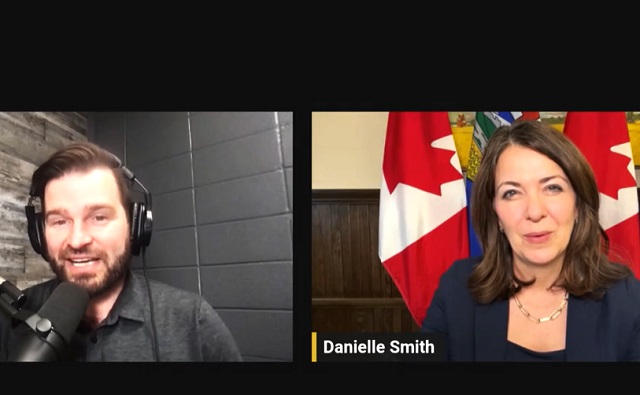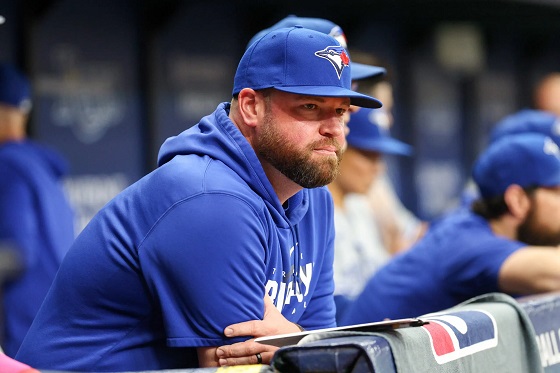Alberta
Danielle Smith promises to strengthen Alberta’s laws to protect speech, vaccine free, gun owners

From LifeSiteNews
‘I believe in freedom’
Alberta Premier Danielle Smith promised to enshrine into “law” protections for people in her province who choose not to be vaccinated as well as strengthen gun rights and safeguard free speech by beefing up the provincial Bill of Rights.
“I can give you my commitment that no one is going to be forced to make a medical choice that they don’t want to,” Smith told local blogger Shaun Newman on his regular “Podcast” show on Monday.
“I just don’t believe that that is the direction that Albertans want to go. I believe in freedom, and so until I can get that enshrined in law, you have my commitment, no one’s going to be forced to be vaccinated.”
Premier Danielle Smith https://t.co/Wg6KaWVfYO
— Shaun Newman Podcast (@SNewmanPodcast) December 18, 2023
Last month, a panel convened by Smith to investigate the previous government’s COVID governance released its findings, recommending many pro-freedom policies be implemented, such as strengthening personal medical freedoms via legislation so that one does not lose their job for refusing a vaccine as well as concluding that Albertans’ rights were indeed infringed on.
The panel was tasked to review “legislation and governance practices used by the Government of Alberta during the management of the COVID-19 public health emergency.”
Notable highlights from the report show a list of what are considered fundamental rights of Albertans that the report recommends the government take steps to protect via the Alberta Bill of Rights.
Newman asked Smith about the panel’s findings and what her government would do with the recommendations. She responded by saying that some work has already been done to ensure that “unelected” health officials do not have sole decision-making power in emergencies.
“We had a health act that essentially gave the exclusive power to one person to shut down our entire economy and if there was any attempt stepped in to moderate those views. That was the part that was considered illegal, which makes no sense,” Smith said.
“What we’ve done is we’ve changed the Public Health Act. So now that the chief medical officer of health gives advice to Cabinet, but Cabinet becomes the ultimate decision-maker, which is how it should be in an emergency.”
Smith is not just talk, however, when it comes to making politicians accountable. She is looking to pass a new law, Bill 6, or the Public Health Amendment Act, that would hold politicians accountable in times of a health crisis by putting sole decision-making on them for health matters instead of unelected medical officers.
Even before Smith became premier, she was not shy in speaking out in favor of the rights of those who chose not to get the COVID shots.
She made headlines in October 2022 after promising she would look at pardoning Christian pastors who were jailed for violating so-called COVID policies while Kenney was premier.
Smith took over from Jason Kenney as leader of the United Conservative Party (UCP) on October 11, 2022, after winning the leadership of the party. Kenney was ousted due to low approval ratings and for reneging on promises not to lock Alberta down as well as enacting a vaccine passport.
Under Kenney, thousands of nurses, doctors, and other healthcare and government workers lost their jobs for choosing to not get the jabs, leading Smith to say – only minutes after being sworn in – that over the past year the “unvaccinated” were the “most discriminated against” group of people in her lifetime.
Smith promises to protect gun rights
When it comes to gun rights of Albertans, Smith pledged that she would do what she can to make sure the federal government stays “out” of its lane and keeps its hands off people’s legally purchased firearms.
“We now just have a bill that’s passed through the federal government, which is going to, presumably, start confiscating the firearms from people who purchased them legally or using them for legal purposes, and is that something that we should also be putting into the Bill of Rights,” Smith said.
“So, the discussion about opening the Bill of Rights began because of wanting to preserve medical choice, we’re seeing the need to expand in on the free speech front because free speech rights are under attack. But we also think that there might be other things that we need to look at.”
Smith noted that she has already had a conversation with one of the MLAs and asked him if he would be “willing to take on a consultation to make sure that when we do amend the Bill of Rights, which we will do, that we’re not missing anything.”
The Canadian federal government’s controversial gun grab bill C-21, which bans many types of guns, including handguns, and mandates a buyback program became law last week after Senators voted 60- 24 in favor of the bill.
In May, it passed in the House of Commons. After initially denying the bill would impact hunters, Prime Minister Justin Trudeau eventually admitted that C-21 would indeed ban certain types of hunting rifles.
Smith, along with premiers from no less than four additional provinces, are opposed to C-21.
Trudeau’s gun-grab was first announced after a deadly mass shooting in Nova Scotia in May 2020 in which Trudeau banned over 1,500 “military-style assault firearms” with a plan to begin buying them back from owners.
If the ban is enforced, legal gun owners in possession of the federally regulated Possession and Acquisition License (PAL) would be barred from buying, selling, transporting, and even importing a slew of guns the government has categorized as “assault-style” rifles.
Alberta
Albertans choose new licence plate design with the “Strong and Free” motto

First new plate in 40 years hit the road in 2026.
Albertans have chosen beautiful Moraine Lake in Banff National Park as the new design for the province’s licence plate.
After three rounds of voting and more than 240,000 votes cast, Albertans have spoken. The iconic Moraine Lake in Banff National Park will be featured on the province’s new licence plate.
Available in mid-2026, echoing the “Strong and Free” motto of our province, the plate reflects Alberta’s bold identity, economic strength and deep-rooted provincial pride. The motto’s inclusion on the licence plates will also serve as a nod to Canada’s national anthem and Alberta’s position as a strong and sovereign province within a united Canada.
“Albertans know who we are and what we stand for: we are strong, free, resilient and united by the natural beauty that defines our home. Moraine Lake is recognized around the world, and the fact that Albertans chose it makes this new plate deeply meaningful. Thank you to the Albertans who cast more than 240,000 votes and helped choose a design that showcases Alberta’s natural beauty and will stand as a proud symbol of our province for years to come.”
Moraine Lake is one of Alberta’s most iconic destinations, making it fitting that it be on the province’s licence plates for motorists around the country to see. The licence plate depicts the breathtaking panoramic view of Moraine Lake that perfectly displays the province’s beautiful Rocky Mountains, which attract visitors from around the world to Alberta.
“Having the iconic Moraine Lake on our licence plates is something we can all be proud to show off. Thank you to every Albertan who cast their vote in our tournament. Because of you, the beauty and strong and free spirit of our province will be on display for motorists across the country.”
If an Albertan wants to replace their current plate for the new licence plate once it is released, they can voluntarily pay a $28 fee. Alternatively, Albertans could obtain a new plate on their vehicle registration renewal date at no additional cost. Motorists may also continue using the previous licence plate once the new licence plate is brought onboard, provided it is still in good condition.
Quick facts
- Alberta’s current licence plate was designed in 1984.
- In 2021, Alberta began a transition from painted to reflective plates with the same design.
- The new design incorporates reflective technology to improve readability for law enforcement and automated systems in low-light conditions, and to meet international standards for visibility, legibility and counterfeit resistance.
Alberta
Edmonton and Red Deer to Host 2027 IIHF World Junior Hockey Championship

News release from the Red Deer Rebels and Hockey Canada
Hockey Canada, in partnership with the Canadian Hockey League (CHL) and International Ice Hockey Federation (IIHF), has announced that the 2027 IIHF World Junior Championship will be played in Edmonton and Red Deer, Alberta, from Dec. 26, 2026 to Jan. 5, 2027.
The successful bid represents a partnership between OEG Sports & Entertainment, the Red Deer Rebels, Hockey Alberta, the Cities of Edmonton and Red Deer, and the Province of Alberta, which made an $11 million commitment in February 2024 to host events in communities throughout the province.
“We are excited to bring the IIHF World Junior Championship back to Edmonton and Red Deer, and to give hockey fans in Alberta and across the country the opportunity to watch the top under-20 players compete for a gold medal right here in Canada,” said Dean McIntosh, senior vice-president of revenue, fan experience and community impact with Hockey Canada. “Both cities have been successful hosts of IIHF and other high-profile international events, and we know our partners in Edmonton and Red Deer will host a world-class event for players, teams, fans and volunteers alike.”
The 18,500-seat Rogers Place, home of the National Hockey League’s Edmonton Oilers and Western Hockey League’s Edmonton Oil Kings, will serve as the primary competition venue and host 17 games, including both semifinals and the medal games. The additional 14 games are set for the 7,050-seat Marchant Crane Centrium, home of the WHL’s Red Deer Rebels.
“Alberta is ready to welcome visitors from around the world for the International Ice Hockey Federation World Junior Championship,” said Andrew Boitchenko, minister of tourism and sport for Alberta. “This event celebrates the spirit of international competition and our province’s passion for hockey, while showcasing Alberta as a world-class destination for sporting events.”
“Edmonton is thrilled to co-host the IIHF World Junior Championship. This tournament is a fantastic opportunity to watch the world’s best junior hockey players right here in our community, showcasing emerging talent and inspiring a new generation of athletes,” said Andrew Knack, mayor of Edmonton. “Hosting world-calibre events like this also injects vital tourism dollars into our local economy, boosts our city’s vibrancy, and solidifies Edmonton’s reputation as a premiere sports tourism destination.”
Edmonton last hosted the IIHF World Junior Championship in August 2022, which was rescheduled from its traditional winter slot due to the COVID-19 pandemic. The gold medal game at the 2022 event was an instant classic, with Mason McTavish making a game-saving play in overtime and Kent Johnson netting the game-winner just over a minute later to give Canada its 19th World Juniors gold medal. The city also hosted in 2021 without fans, and was a co-host with Calgary for the 2012 edition of the event. Red Deer was a co-host for the cancelled 2022 World Juniors, and first hosted the annual under-20 tournament in 1995.
“We are proud to welcome the 2027 IIHF World Junior Championship back to our region,” said Jesse Smith, chief executive officer of Tourism Red Deer. “Red Deer’s love for the game and our hospitality will ensure an unforgettable experience for every athlete and fan.”
“The World Juniors give Edmonton an extraordinary opportunity to showcase our city on the world stage,” said Arlindo Gomes, vice-president of business development and venues management with Explore Edmonton. “This event strengthens our global reputation as a premier international sport destination while delivering more than $90 million in total economic impact to our community and inspiring the next generation of hockey players and fans. Edmonton loves hockey and we cannot wait to welcome global athletes and fans.”
Pre-tournament games for the 2027 World Juniors are expected to take place throughout Alberta, allowing fans across the province to watch the best junior hockey players from 10 countries before the puck officially drops in Edmonton and Red Deer on Boxing Day.
With demand for tickets expected to exceed availability, more information about a priority ticket draw and tournament ticket packages will be announced in the coming months. Fans looking to receive updates about the 2027 IIHF World Junior Championship as soon as they become available can sign up to become a Hockey Canada Insider today.
“On behalf of all of us at OEG Sports & Entertainment, we are proud to once again be hosting the IIHF World Junior Championship and the best young stars on the planet,” said Stu Ballantyne, president and chief operating officer of Rogers Place and ICE District. “The World Juniors is one of the most celebrated tournaments in hockey, and bringing it back to Edmonton is an honour for our city, our fans and our entire organization. ICE District and Rogers Place were built to facilitate and showcase the very best in sport and entertainment, and we look forward to working closely with Hockey Canada and other partners to deliver an unforgettable experience for the athletes, fans and the global hockey community.”
“We are beyond excited for our fans, partners and community to once again welcome the hockey world to Red Deer,” said Merrick Sutter, senior vice-president of the Red Deer Rebels. “This is a community that loves events, and we know their passion will be on full display once again next December.”
For more information on Hockey Canada and the 2027 IIHF World Junior Championship, please visit HockeyCanada.ca, or follow along through social media on Facebook, X, Instagram and TikTok.
-

 Alberta2 days ago
Alberta2 days agoCalgary mayor should retain ‘blanket rezoning’ for sake of Calgarian families
-

 Bruce Dowbiggin2 days ago
Bruce Dowbiggin2 days agoSports 50/50 Draws: Make Sure You Read The Small Print
-

 Alberta2 days ago
Alberta2 days agoAlberta Offers Enormous Advantages for AI Data Centres
-

 espionage2 days ago
espionage2 days agoTrump says release the Epstein files
-

 COVID-192 days ago
COVID-192 days agoNew report warns Ottawa’s ‘nudge’ unit erodes democracy and public trust
-

 Censorship Industrial Complex2 days ago
Censorship Industrial Complex2 days agoQuebec City faces lawsuit after cancelling Christian event over “controversial” artist
-

 Alberta1 day ago
Alberta1 day agoNational Crisis Approaching Due To The Carney Government’s Centrally Planned Green Economy
-

 Uncategorized17 hours ago
Uncategorized17 hours agoCost of bureaucracy balloons 80 per cent in 10 years: Public Accounts









